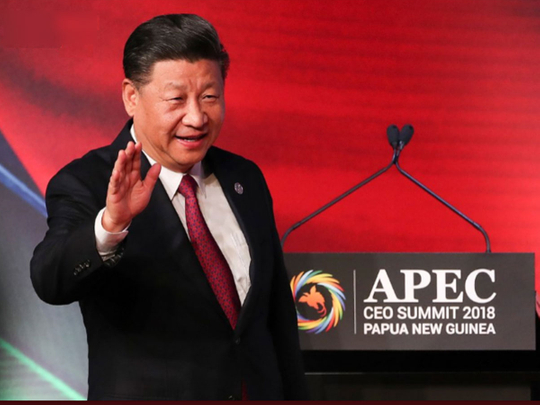
Dubai: Conflicting signals from the US and China about their trade relationship will be on investors minds when markets on Monday.
Trump suggested on Friday that China may not impose more duties on US products, soothing frayed investor nerves, but Wilbur Ross, the US commerce secretary said that trade deal with China was “impossible” before January.
Then on Saturday, Chinese President Xi Jinping and US Vice-President Mike Pence traded barbs at a summit as both tried to blame each other for protectionist measures.
Market participants bought into the indications from Trump, which triggered a recovery on the Dow Jones Industrial Average (DJIA) on Friday, but experts are now sounding a different tone with developments in the past 48 hours.
Choppy markets
“The market reacted positively to Trump’s tweet. The lack of information on the trade war sounds like Trump is trying to trump the market down. [The] market would look to see any tangible news and till then markets would continue to be choppy,” Nadi Bargouti, head of asset management and managing director at Emirates Investment Bank, told Gulf News.
Trump is due to meet with China’s President Xi Jinping late this month in Buenos Aires on the sidelines of the Group of 20 (G20) leaders summit.
On Friday, the Dow Jones Industrial Average (DJIA) closed 0.49 per cent higher at 25,413.22, recovering partial losses of 1.8 per cent registered in the week. The S&P 500 index closed with marginal losses of 0.22 per cent to be at 2,736.27.
However, going ahead, weak guidance from US companies is making market experts cautious.
“US equities continue to trade at ever higher levels, as earnings have been supportive. A general impression is that is a weak guidance from US companies. Earnings have been up 26 per cent year-on-year and it is impossible to sustain going forward. The 17-times forward earnings in the US [are] dangerously excessive,” Bargouti said.
The DJIA has gained more than 2.3 per cent so far in the year, while the S&P index has gained 1.5 per cent as higher-than-expected growth fed into company earnings, while expectations of a faster-than-expected rise in interest rates, and fears of a trade war have kept the upside limited.
“The attractiveness of US equities is [a] lack of better alternatives. US markets [are] the safe haven for investors in choppy markets. [Emerging markets} have their own issues in terms of trade wars. Investors are nervous on what to do next with their US holdings,” he added.
Plunging pound
The pound fell half a per cent more on Friday, adding to the previous session’s 2 per cent fall, the sharpest since the Brexit vote.
Analysts said the British currency may decline further as the country grapples with further political uncertainty on the daunting task that UK Prime Minister Theresa May faces in getting the draft Brexit deal approved by Parliament.
“This is not the end of the saga and with May battling to stay in power in order to deliver what she feels is ‘the best possible deal’ sterling will remain volatile. The currency may fall to 1.25 [against the dollar] if there is a possibility of a snap elections,” Konstantinos Anthis, head of Research at ADS Securities, said.








